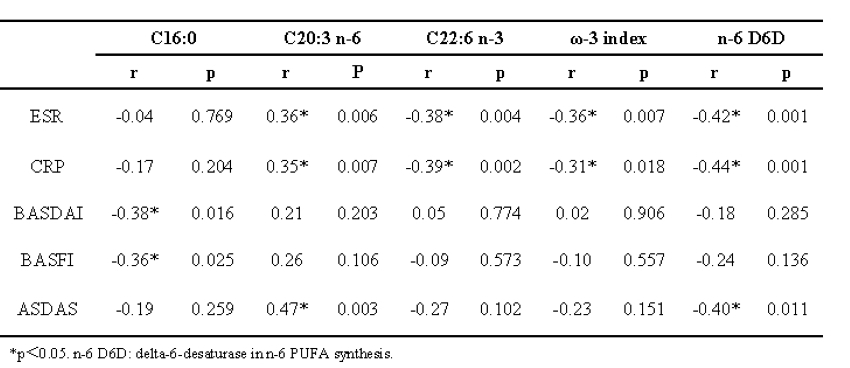Session Information
Date: Monday, November 8, 2021
Title: Epidemiology & Public Health Poster III: Other Rheumatic & Musculoskeletal Diseases (1022–1060)
Session Type: Poster Session C
Session Time: 8:30AM-10:30AM
Background/Purpose: To investigate the composition of phospholipid fatty acids in erythrocyte membranes from patients with ankylosing spondylitis (AS), and determine the correlations between the percentage of fatty acids and inflammation level, disease activity and functional capacity in a cross-sectional study.
Methods: Fatty acids in erythrocyte membranes of 20 healthy subjects and 59 patients with AS, who fulfilled the modified New York criteria, were measured using gas chromatography-mass spectrometric (GC-MS). Inflammation level was measured by the erythrocyte sedimentation rate (ESR) and C-reactive protein (CRP). Disease activity was quantified using Bath Ankylosing Spondylitis Disease Activity Index (BASDAI) and Ankylosing Spondylitis Disease Activity Score (ASDAS), and functional capacity was Bath Ankylosing Spondylitis Functional Index (BASFI).
Results: Lower docosahexaenoic acid (DHA) and higher palmitic acid and dihomo-γ-linolenic acid (DGLA) were found in erythrocyte membranes from patients with AS compared with healthy subjects (Table 1). There were negative correlations of palmitic acid with BASDAI and BASFI (r=-0.38 and r=-0.36, respectively, p<0.05; Table 2), and there were positive correlations of DGLA with ESR, CRP and ASDAS (r=0.36, r=0.35 and 0.47, respectively, p<0.05). DHA was negatively correlated to ESR and CRP (r=-0.38 and r=-0.35, respectively, p<0.05).
Conclusion: Different composition of fatty acids in erythrocyte membranes was found between healthy subjects and patients with AS, and palmitic acid, DGLA and DHA were correlated to inflammation level, diseases activity and functional capacity.
 Table 1.Composition of phospholipid fatty acids in erythrocyte membranes from 20 healthy controls and 59 patients with ankylosing spondylitis.
Table 1.Composition of phospholipid fatty acids in erythrocyte membranes from 20 healthy controls and 59 patients with ankylosing spondylitis.
 Table 2. Correlations of Palmitic acid, DGLA, DHA, ω_3 index, n-6 D6D with ESR, CRP, BASDAI, BASFI, ASDAS
Table 2. Correlations of Palmitic acid, DGLA, DHA, ω_3 index, n-6 D6D with ESR, CRP, BASDAI, BASFI, ASDAS
To cite this abstract in AMA style:
Chen J, Huang X, Huang Q, Huang Z, Huang Y, Liu Y, Huang L, Sun S, ji Z, Li T. Composition of Phospholipid Fatty Acids in Erythrocyte Membranes from Patients with Ankylosing Spondylitis [abstract]. Arthritis Rheumatol. 2021; 73 (suppl 9). https://acrabstracts.org/abstract/composition-of-phospholipid-fatty-acids-in-erythrocyte-membranes-from-patients-with-ankylosing-spondylitis/. Accessed .« Back to ACR Convergence 2021
ACR Meeting Abstracts - https://acrabstracts.org/abstract/composition-of-phospholipid-fatty-acids-in-erythrocyte-membranes-from-patients-with-ankylosing-spondylitis/
